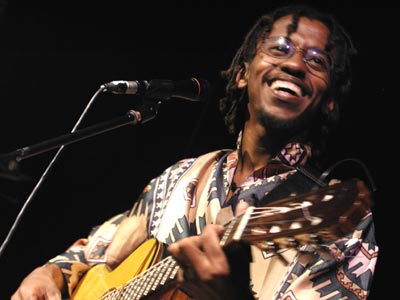13.20.1 Yolepsis Hechevarría Bonilla (Yolo Bonilla)

Yolepsis Hechevarría Bonilla, better known as Yolo Bonilla, demonstrated his strong artistic inclination from a very early age. At just nine years old, he ventured into the complex world of literature, working in the genres of poetry and short stories, which earned him national recognition and awards.
In 1992, he learned to play the guitar and decided to compose songs. As a singer-songwriter, he performed at various amateur festivals organized by the Federation of Secondary School Students, where he won several awards.
Later, he enrolled at the University and joined the Amateur Artists Movement of the Federation of University Students. In 1996, he joined the Hermanos Saíz Association (AHS). With the Amateur Artists Movement, he participated in the national festivals of Holguín in 1998, Ciego de Ávila in 2000, and Camagüey in 2002, winning first prizes and other special recognitions awarded by various institutions for the quality of his composition.
Thus began Yolo Bonilla, who began performing in concerts in various centers of the capital, starting with the “Saliendo aflote” tour at various university campuses in Havana and other cities across the country. He performed from 1999 to 2006 at venues in the capital, including the Palacio del Segundo Cabo, Castillo de la Real Fuerza, the Rubén Martínez Villena Library, the Instituto Superior de Ciencias Médicas, the Casas de la FEU de la CUJAE, and the José Martí Memorial, among others. He also performed with other young people of his generation during the 11th Ibero-American Summit of Heads of State and the Havana International Book Fair, in concerts sponsored by the Hermanos Saíz Association.
Following Yolo Bonilla’s two concerts at the Casa del Caribe during the World Festival of Youth and Students, the National Council of Cultural Centers has decided to nominate him for the first category A of the Amateur Artists Movement, for his entire artistic career.
To dedicate himself professionally to music, he decided to abandon his career as a doctor in 2003. He began developing troubadour compositions aimed at fusing different rhythms from Cuban and Brazilian music, incorporating elements of jazz, hip hop, funk, reggae, and rock into his music. That year, he gave his first concert at the opening of the summer program, held at the “Astral” Theater (Calzada de Infanta No. 501, Centro Habana, Havana), in Havana, alongside fourteen other musicians who had graduated from art schools.
From that moment on, other stages have seen Yolepsis Hechevarría Bonilla’s musical proposal mature in each concert she gives, where she has shared with prominent artists such as David Torrens, Gerardo Alfonso, Sara González, Santiago Feliú, Teresita Fernández, the Moncada group, Telmary and Interactivo, Kumar, Mate and Alberto Faya, among others.
In 2004, he competed in the “Longina” National Trova Festival in Santa Clara and received the National Project distinction from the Hermanos Saiz Association, as well as a scholarship from the Cuban Institute of Music in recognition of his artistic work. That same year, he performed at the 14th International Meeting of Caribbean Cultures, held in Martinique, and at the Fourth Biennial of the UNE (National University of El Salvador) in 2005, held in Sao Paulo, Brazil. He also worked as a Music Specialist at the AHS (Academic Higher Education Institute) in Havana for two years.
Yolo Bonilla’s debut album, “Anhelos de pez,” is a concert performed at the Bellas Artes Theater. His second album, “Y luego qué…?”, was recorded at TANCEL Lab studios with the band that accompanies him to this day, and featured collaborations with excellent musicians such as Reinier Mendoza, David Faya, Abel Calderón, Ariel Bringues, and Carlos Sarduy, among others.
In 2005, Yolo Bonilla presented a musical script for a series of educational cartoons called “Pipo Junquillo” to the Cuban Institute of Radio and Television.
His work has been highly praised by the country’s print press. Very positive articles have been published by Joaquín Borges Triana and Vladimir Zamora in Juventud Rebelde and Caimán Barbudo, respectively, as well as favorable reviews from online magazines such as La Jiribilla and Esquife.
Currently, Yolo Bonilla is one of the most prominent exponents of contemporary music in Cuba, and is therefore included in the catalog of the National Center for Cuban Popular Music.








